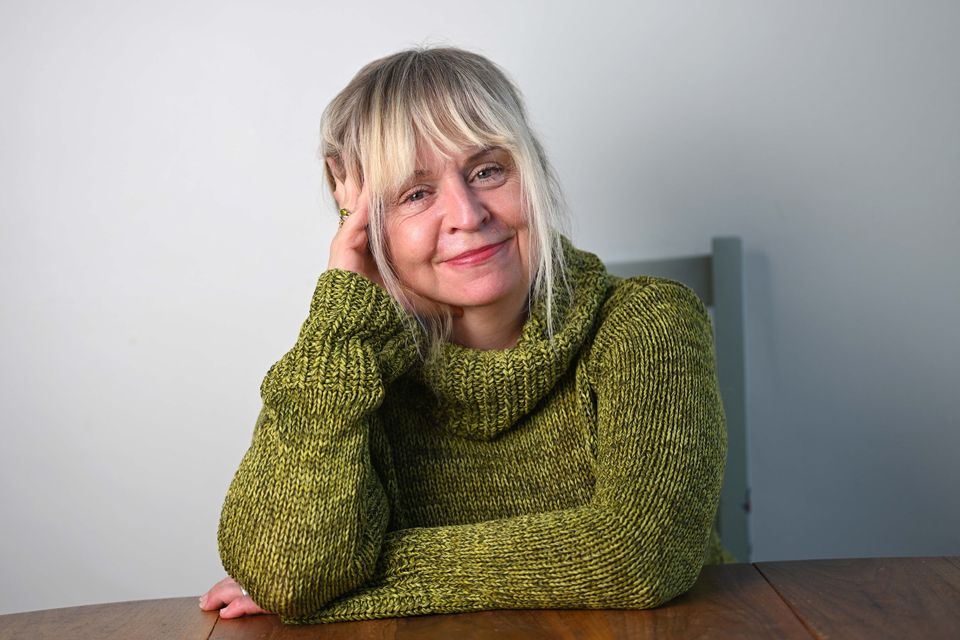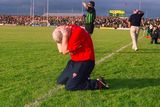Louth author Estelle Birdy discusses writing her debut novel Ravelling
Dundalk author Estelle Birdy talks to Margaret Roddy about her debut novel Ravelling
Dundalk writer Estelle Birdy whose debut novel Ravelling is published on May 9
It’s a wet day in late spring when I meet up with Dundalk writer Estelle Birdy whose debut novel Ravelling comes out on Friday May 9.
“The tulips are fantastic,” she says to the barista in the cafe at the Botantic Gardens where we take shelter from the rain.
This willingness to chat with everyone is not just a reflection of her warm personality but also provides her with a rich source of material for her writing, giving it an authentic voice.
“I’m always intrigued by other people’s stories and I’ve a face that makes people want to stop and and talk to me, to share stories,” she says.
This, of course, is a good thing for a writer and many of the stories she has heard have found their way in Ravelling.
It charts the fortunes of a group of five young men, living in and around The Liberties area of Dublin 8.
It opens as they mitch off school to attend the funeral of a friend – a homeless man who died by suicide.
Estelle says that the plot was inspired by an incident which happened one night when she was coming home from work.
“There was this homeless young man sitting on the ground near the Luas stop. He did a bit of writing and was getting a house. As I was talking to him, this young fella in a North Face jacket and fade hair do, the uniform of the flats, came behind me and slides up in front of your man and dropped a chunk of change into his hat, before walking down to the flats. I said to your man, he’s very generous and he said you’d be surprised, as the young fellows are the ones who stop and chat, and give him food and money. I said ‘what a legend’.
This gave Estelle the kernel of an idea which evolved into the book.
“I thought someone needs to be writing about these young men, these legends. The male heroes of Irish legends are so flawed, Chu Chulainn is so flawed.”
Living close to the Liberties area of Dublin and with a family of young adults, Estelle knows only too well the challenges facing young people, particularly men, growing up in the city today.
“My son went to Synge Street school and I’d have all these young fellows from different countries in my house. They would be really witty and funny, even though they might be coping with really bad shit, and might not be behaving great all the time.”
“When living in the heart of the city, you meet so many homeless young men, less so women and girls, a and a lot of the time the young men are sleeping rough on the streets. They have to deal with a lot of violence, they will be pissed on, will have had lighter fluid thrown on them by thugs thinking it’s a laugh to set them alight. It’s constant. And then there’s these legends who come and talk to them, who don’t discriminate against them.”
Estelle began writing down “loads of little stories” that she’d come across when out and about in her community.
“There are lots of things I’ve seen. things I’ve been told, and they are all in my head. It’s like the voices of the five main characters were in my head and I just had to get it down on paper.”
Those five characters are Deano, a weed-smoking hurling star who lives with his aunt in an about-to-be-demolished flat; Hamza, a Pakistani Muslim atheist and precocious academic; Oisín, empathetic to the point of policing how others speak; Congolese nature lover Benit, and Karl, a maybe-gay fashionista who dreams of something better while immersing himself in his art.
The book follows them as they deal with parties, their Leaving Certificate, racism, poverty, drugs, violence and Garda harassment, reflecting the multi-cultural city that Dublin is now.
“The sixth main character is the Liberties area, the community, where all the legends, the young fellows live. And maybe it’s the girls and woman around them, those who quietly save them, who are the real legends. The heroes might actually be women.”
“It took a city to write this book,” says Estelle. “It’s a story about threads, the threads of friendship, that we’re all the same and have to get along. That’s what the cover is about.”
The book, which is being compared to Trainspotting, White Teeth and Milkman, has already been optioned by Sleeper Films for a major TV series.
This, however, is far from overnight success for Estelle, who has worked in a huge variety of jobs.
Born in London, her family lived in Carrickmacross for a time before moved to the seaside village of Blackrock near Dundalk in Co Louth.
She always had a love of stories, and remembers, when they were still living in London, she remembers how her mother would buy her an apple and a book, as she didn’t like sweets.
“I’d bang on about getting a book, and I couldn’t wait to have them read to me, so I would make my mother side down on the little low walls on the way from the Tube and read them to me.”
She learned to read even before she went to primary school in Blackrock, where she fondly remembers her teacher reading Irish folklore and legends.
“From when I was very, very young, in senior infants and first class, I’d go off and write stories just for the craic.”
She recently found a copy book in which she had described how the Virgin Mary appeared to her one time she visited Ladywell Shrine.
The only thing was she had never been to the Shrine and only visited it in 2021 when she brought her twin daughters there!
She also set up a newspaper The Birdy and Benny Express when she was in fifth class and won numerous essay competitions.
Estelle went to St Vincent’s Secondary School and fondly remembers her teachers, Martin Kierans and the late Joan Kerley.
Surprisingly, she opted to study law, not English at university, and although she admits she was “a terrible law student”, she doesn’t regret that decision.
“It does give you a good grounding in logical thinking and analysis,” she says.
She subsequently did a post-grad diploma in Linguists, saying she “loves language and semantics .”
She worked in recruitment, HR, communications and website management as well as teaching in a local family centre
“I was also teaching Anglo Irish literature and poetry to women who were refugees and asylum seekers.”
Writing, however, was something she always did in the background, setting up a blog when she taught yoga.
When her mother died in 2017, leaving her some money, Estelle decided to do a Masters in Creative Writing at UCD, where her tutors included Anne Enright and Sebastian Barry.
“It was just brilliant. You had to produce work all the time and I started getting short-listed for competitions and winning awards.”
She graduated from the course in December 2019 and got taken on by Lilliput Press in early 2020. “And then all hell broke loose,” she says, recalling how the pandemic brought the world to a standstill,
Ravelling by Estelle Birdy launches next Thursday 9 May from 6pm at Hodges Figgis. She will also be in Roe River Books on Friday June 14.













